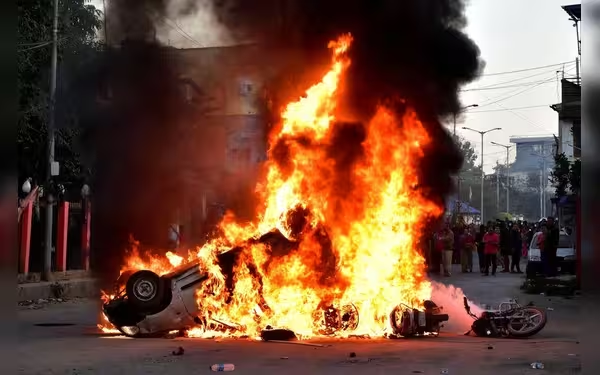Sunday, December 22, 2024 03:37 PM
Violence Erupts in Manipur: 23 Arrested Amid Protests
- 23 individuals arrested following violent protests in Manipur.
- Over 250 deaths reported since May 2023 due to clashes.
- Indefinite curfew imposed as tensions escalate in Imphal.
 Image Credits: thefrontierpost
Image Credits: thefrontierpostViolence in Manipur leads to 23 arrests amid protests over recent killings, highlighting ongoing ethnic tensions and unrest in the region.
In recent days, the northeastern Indian state of Manipur has been engulfed in violence and unrest, leading to the arrest of 23 individuals. This turmoil follows a series of protests against violent killings that have shaken the community. The situation escalated as demonstrators defied a curfew, resulting in the ransacking and arson of homes belonging to lawmakers and ministers.
The unrest in Manipur is not a new phenomenon. Since May 2023, the region has witnessed inter-communal clashes primarily between the Meitei and Kuki communities. These clashes have tragically resulted in over 250 deaths and displaced around 60,000 people. The recent protests were sparked by the deaths of two women and two children, which have raised serious concerns about accountability and safety in the area.
On Saturday, the violence reached a peak when police were forced to use tear gas to disperse a large mob. Reports indicate that eight individuals sustained injuries during these confrontations. In response to the escalating situation, an indefinite curfew was imposed, and internet and mobile services were suspended to prevent further unrest.
As the situation stands, the state capital, Imphal, is under close watch by law enforcement. A senior police official remarked, “The situation is relatively calm today but unpredictable.” This statement reflects the fragile nature of peace in the region, as tensions remain high.
Adding to the grim atmosphere, the body of a woman, believed to be part of a missing Meitei family, was discovered in a river. This discovery, along with the recovery of three other bodies, including two children, has intensified fears and suspicions among the communities. Authorities are currently working to identify these individuals, and it is suspected that they may be linked to the ongoing violence.
The recent events have highlighted the deep divisions within Manipur, which has effectively split into two ethnic enclaves: the Meitei-controlled valley and the Kuki-dominated hills. This division is further complicated by a stretch of no-man’s land that is monitored by federal forces.
The situation in Manipur serves as a stark reminder of the fragility of peace in regions marked by ethnic tensions. As communities grapple with the aftermath of violence, it is crucial for local leaders and the government to prioritize dialogue and reconciliation. Only through understanding and cooperation can the people of Manipur hope to heal and move forward from this tragic chapter in their history.













